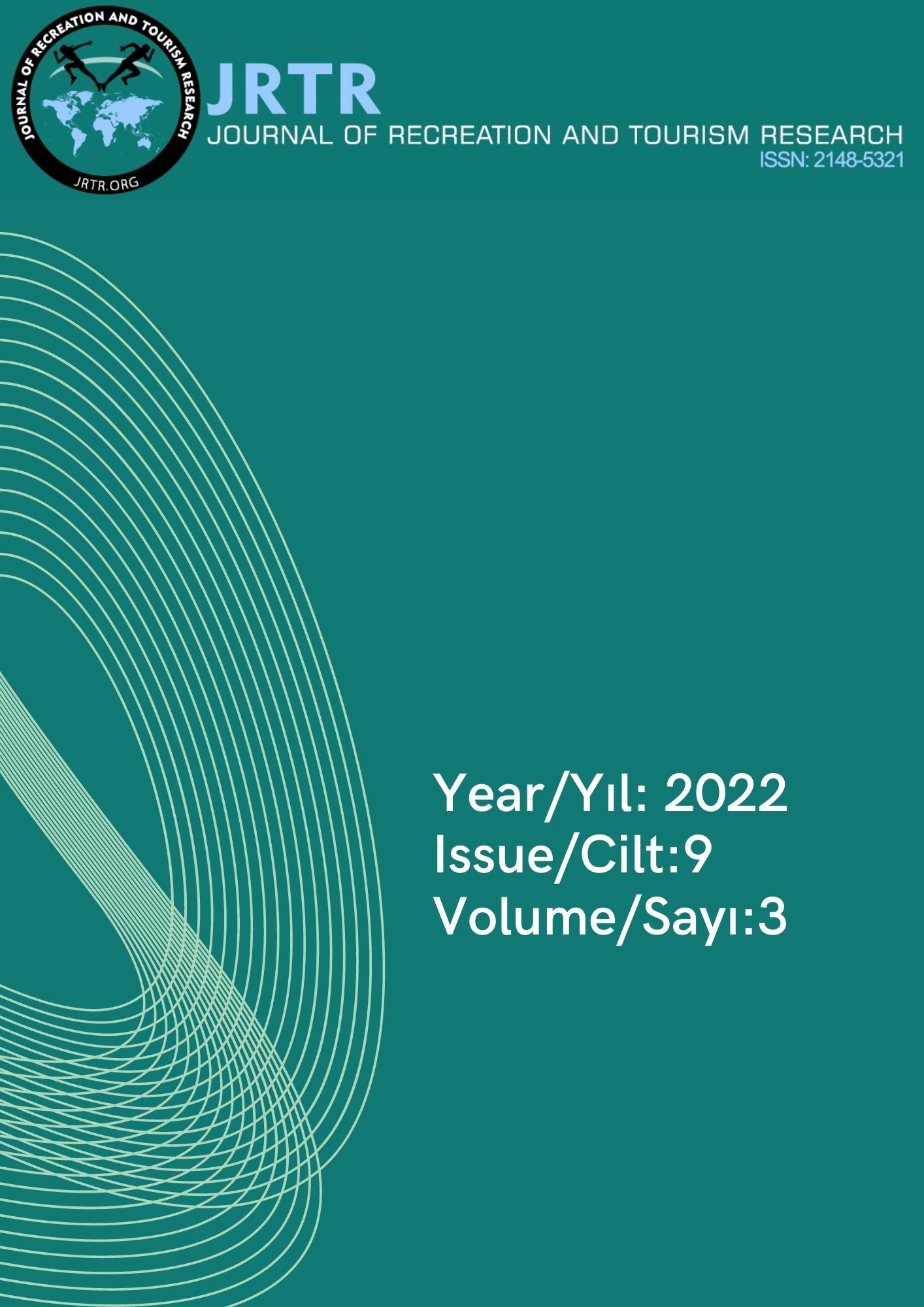Guide But Entertain! Investigating The Experiences of Rafting Tourism Participants
DOI:
https://doi.org/10.5281/zenodo.7130307Keywords:
Rafting, Sporting events, Boat guides, Participant experienceAbstract
Rafting is within the category of water sports, making it a suitable leisure activity for both individuals and groups. The products and services provided by the rafting enterprises both promote the area's natural beauty and enable the area to grow by promoting tourism there. Rafting firms must develop their safety, sanitary, and financial aspects under the demands of the participants to provide quality services. For rafting companies to get certified, participant experiences are crucial. The assessments of people participating in rafting sports activities such as lodging, food and beverage, surroundings, and boat guides were evaluated in this study. To do this, semi-structured interviews with 23 customers of rafting companies were undertaken. Findings have shown that people value safety and cleanliness in rafting companies as well as professional boat guides and that they have bad experiences with the food, drink, and lodging services offered.
Keywords: Rafting, sporting events, boat guides, participant experience.
Downloads
References
Albayrak A. (2013). Alternatif Turizm. Ankara: Detay Yayıncılık.
Buckley, R. (2012). Rush as a key motivation in skilled adventure tourism: Resolving the risk recreation paradox. Tourism Management, 33(4), 961-970.
Demiray, H. (2022). Macera turizmi katılımcılarının motivasyon ve memnuniyetleri: Rafting örneği. (Doktora Tezi). Karabük Üniversitesi, Turizm İşletmeciliği Anabilim Dalı.
Farooquee, N. A., Budal, T. K., and Maikhuri, R. K. (2008). Environmental and socio-cultural impacts of river rafting and camping on Ganga in Uttarakhand Himalaya. Current Science, 587-594.
Fluker, M. R. and Turner, L. W. (2000). Needs, motivations, and expectations of a commercial whitewater rafting experience. Journal of travel research, 38(4), 380-389.
Flypgs (2022), Ekstrem Sporlar-Rafting, https://www.flypgs.com/ekstremsporlar/rafting, [Accessed 23.05.2022].
Gülmez, M., Soysal, A. N., ve Büyükdağ, N. (2019). Rafting su sporları işletmelerinin sorunları ve çözüm önerileri. Avrasya Sosyal ve Ekonomi Araştırmaları Dergisi, 6(12), 99-111.
Holstein, J. A., and Gubrium, J. F. (2004). Context: Working it up, down and across. Qualitative research practice, 297-311.
Huberman, M., and Miles, M. B. (2002). The qualitative researcher's companion. sage.
Jamal, S. A., Aminudin, N. and Kausar, D. R. (2019). Family adventure tourism motives and decision-making: A case of whitewater rafting. Journal of Outdoor Recreation and Tourism, 25, 10-15.
Keleş E., Gül A., Tuğluer M., Uzun Ö. F. (2014). Antalyaköprüçay rafting merkezinin turizm ve rekreasyonel yönden mevcut durum analizi. III. Uluslararası Odun Dışı Orman Ürünleri Sempozyumu 8-10 Mayıs 2014, s. 809-819, Kahramanmaraş.
Koç, D. (2019). Rafting turizminin bölgesel ekonomiye etkileri: Antalya köprülü kanyon örneği (Doktora Tezi) Necmettin Erbakan Üniversitesi, Sosyal Bilimler Enstitüsü.
Kozak N., Kozak A.M. ve Kozak M. (2001). Genel Turizm, İlkeler Kavramlar. Ankara: Detay Yayıncılık.
Molera, L. and Abaladejo, I. P. (2007). Profiling segments of tourists in rural areas of SouthEastern Spain. Tourism Management, 28(3), 757–767.
Nurlaila, S. S., Susanto, E. and Afgani, K. F. (2021). The identification of potential rafting tourism products in citepok village, sumedang regency, west java province. Journal of Tourism Sustainability, 1(1), 32-42.
Polat, E., Keles, E., Uzun, F. and Gul, A. (2016). Sustainable rafting tourism planning and management. An example of Antalya-Koprucay Rafting Area. Journal of Environmental Protection and Ecology, 17(2), 789-795.
Schreyer, R., and Roggenbuck, J. W. (1978). The influence of experience expectations on crowding perceptions and social‐psychological carrying capacities. Leisure Sciences, 1(4), 373-394.
Yıldırım, A. ve Şimşek, H. (2011). Sosyal bilimlerde nitel araştırma yöntemleri (8. Baskı). Ankara: Seçkin Yayıncılık.
Wu, C. H. J., and Liang, R. D. (2011). The relationship between white-water rafting experience formation and customer reaction: A flow theory perspective. Tourism Management, 32(2), 317-325.
Downloads
Published
How to Cite
Issue
Section
License
Copyright (c) 2022 Journal of Recreation and Tourism Research

This work is licensed under a Creative Commons Attribution-NonCommercial 4.0 International License.






